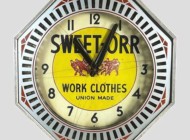COTSWOLD, ENGLAND — The story originally appeared on the cover of Antique Trade Gazette’s December 1 issue: UK auction house Moore Allen & Innocent would charge £10 for condition reports on lots that are estimated at less than £100.
ATG quoted auction firm partner Philip Allwood saying, “It is no longer possible to make money on the lower-end goods that we once relied on for our bread and butter. The bread has gone stale and the butter is rancid.”
Allwood goes on to explain the economics of the estate auction business: “In terms of our overheads, it costs us around £30 per lot, so those that are less than £50 are costing us money to store, photograph and catalog.”
Along with the new policy, the auction house said they would not sell boxed lots and lower value items online, instead offering them exclusively to in-house bidders preceding their cataloged sales. The policy aimed to pull more people into the auction gallery for sales.
The move aims to reckon with a truth in the business: every time a seller moves, catalogs or lists an item for sale, the more costly that item is to sell.
Response to the story was theatrical and negative, providing for good reading in the Letters & Opinion column of the following issues.
“Once again we have an auctioneer defending an increased charge with various excuses given for the necessity,” wrote Niall Milligan of Forrest and Fraser Fine Silver. “There really is no end in sight for the way in which buyers will be penalized for spending their money at auction.”
“I’m horrified to hear that an auction house plans to charge for condition reports,” wrote ATG reader Robert Pugh. “If the auctioneer fancied buying something from a dealer, what would be his reaction if the dealer asked for payment before pointing out the faults?”
Steve Kember, a past customer of the auction house, chimes in: “I have purchased from Moore Allen & Innocent on a number of occasions and have always found them to very helpful and efficient, but their idea of charging for condition reports is absolutely ridiculous, and another nail in the dealer’s coffin.”
ATG reader Steve Kember grapples with the policy through the lens of “sleepers,” saying, “I’m reminded of the time when I tried to arrange a telephone bid on a small piece of Tunbridge Ware. This was being offered at an established saleroom in the south of England. No estimate was listed. The auction room considered the item to be rather insignificant. The receptionist greeted my request with as much lip-curling contempt as she could muster: ‘We don’t allow telephone bids for low-value items under £100.’ How could I tell her that I’d sold the last one for £1,800? What was I supposed to do? Leave a £1,500 commission bid? Not likely. The point is that auctioneers don’t know everything. The good ones understand that.”
While the auction house said that the condition report fee would be refunded to successful buyers, that point did little to tame the outrage. This comes as many estate auction houses wrestle with models of profitability for lower end items.
For additional information, www.mooreallen.co.uk.




